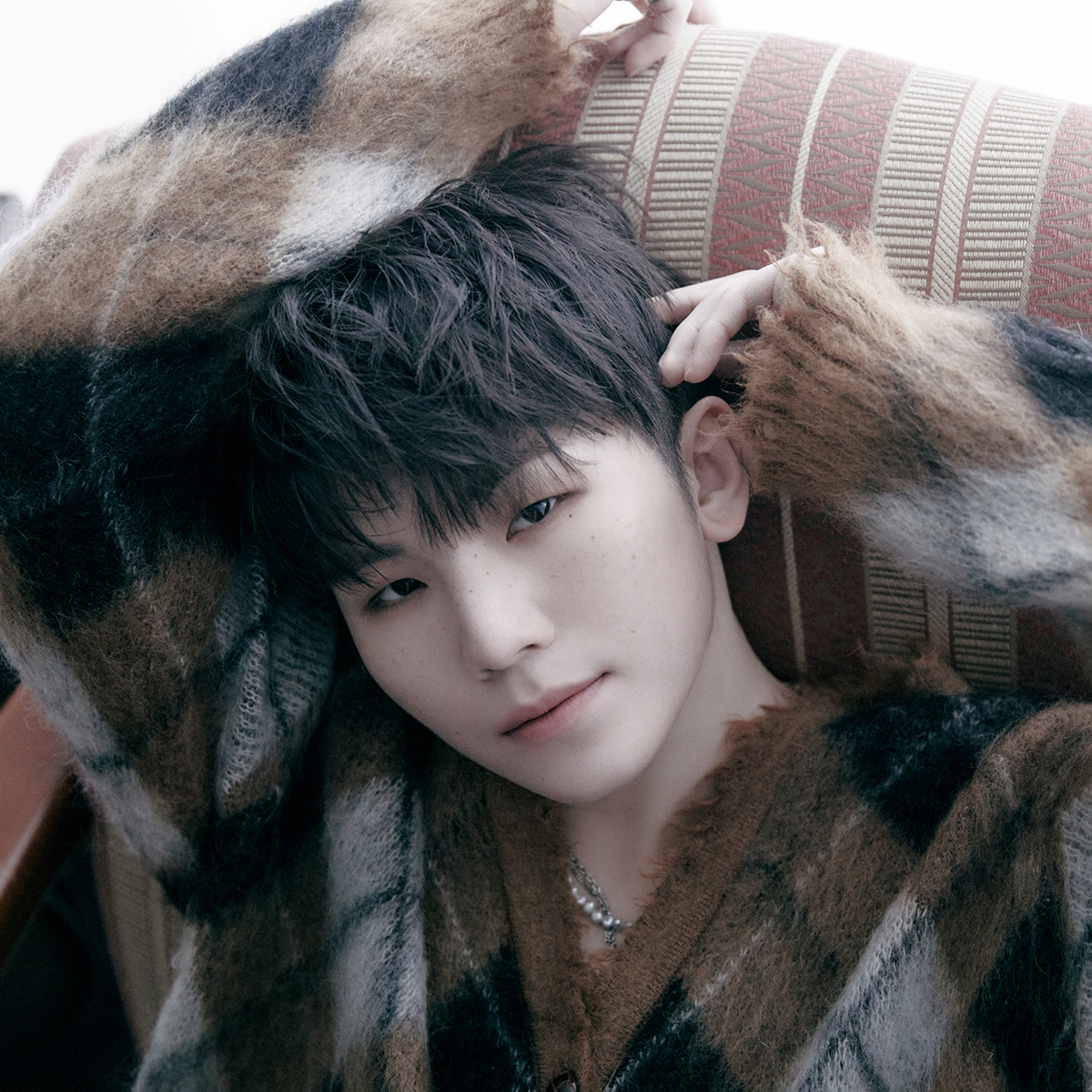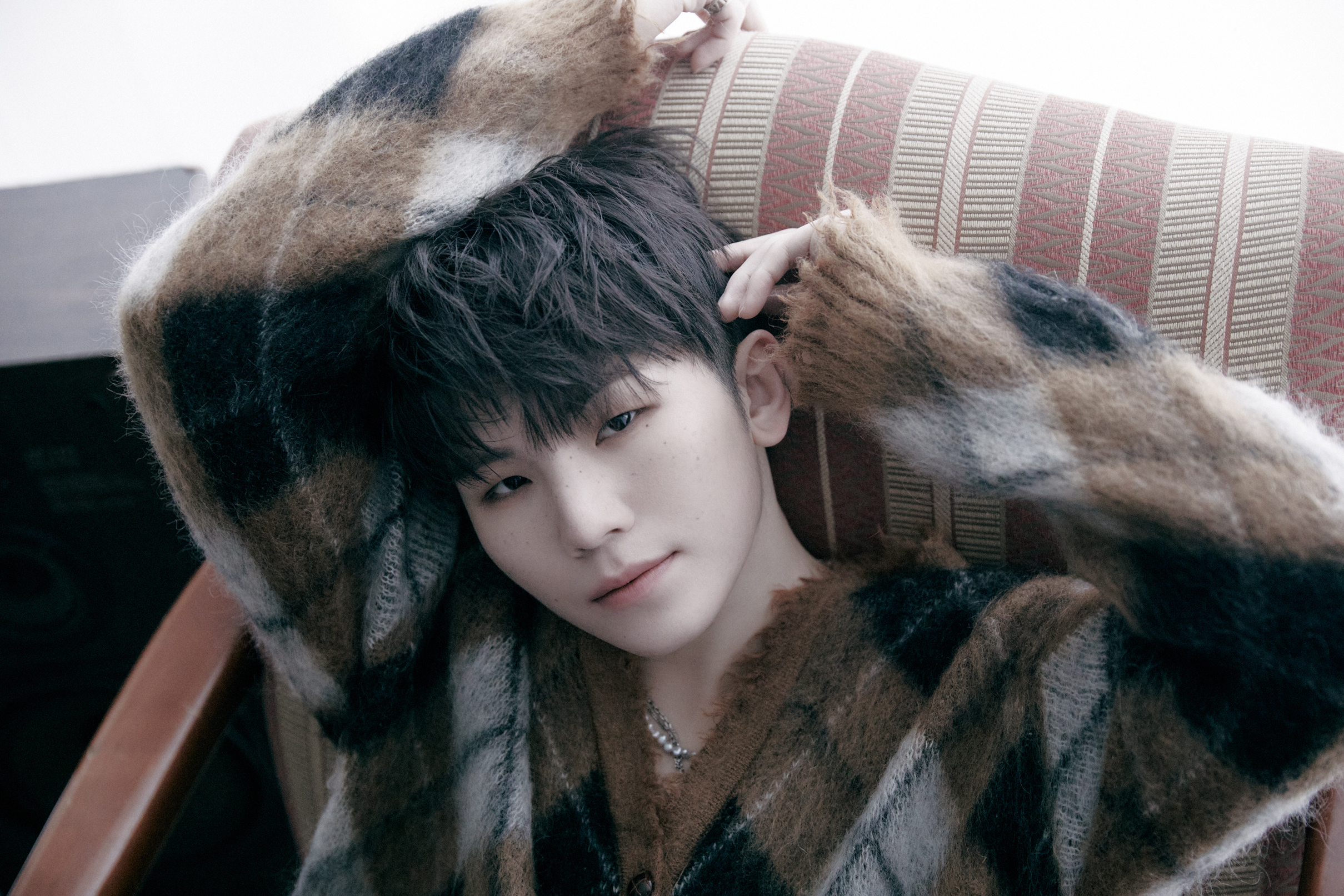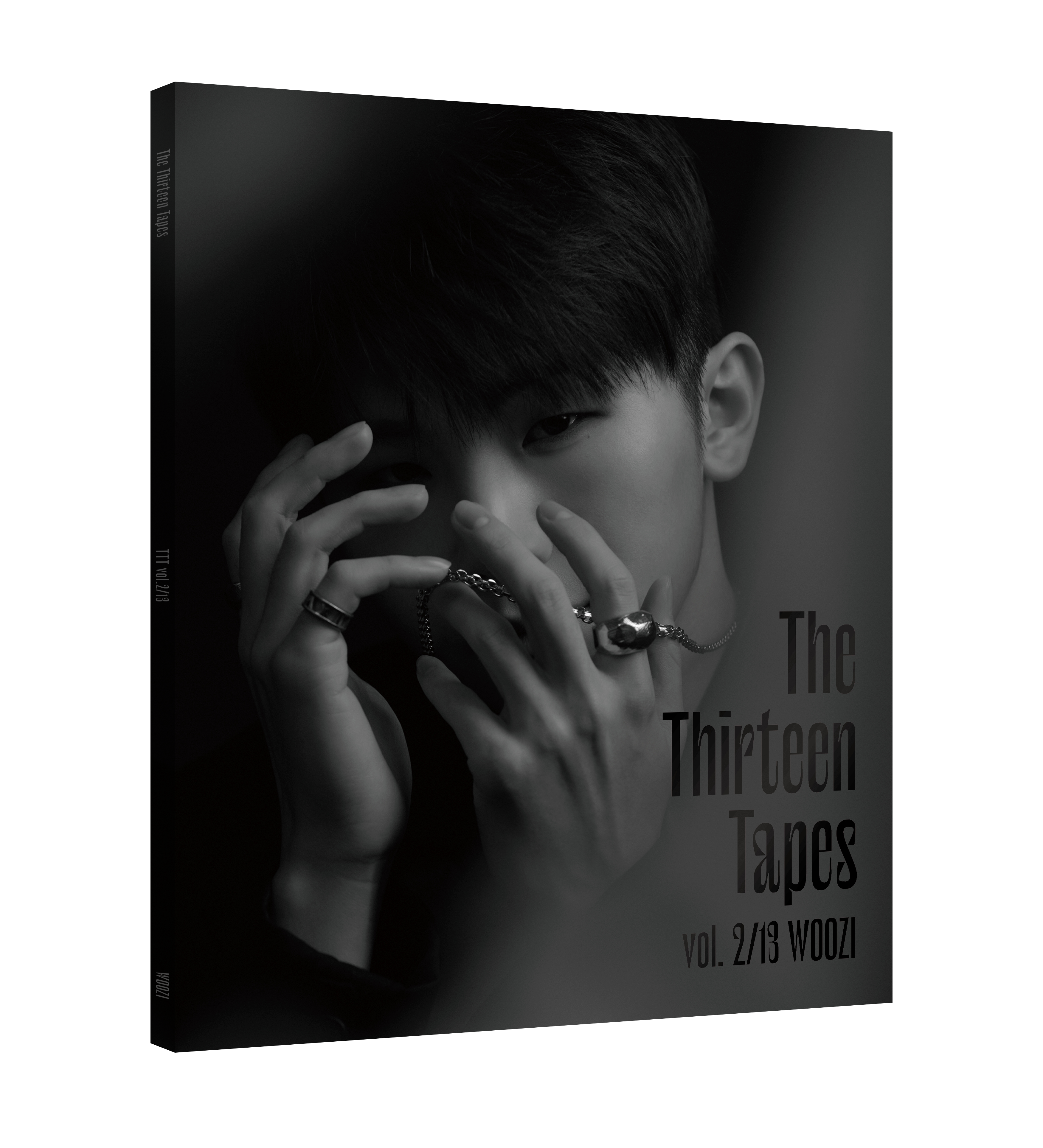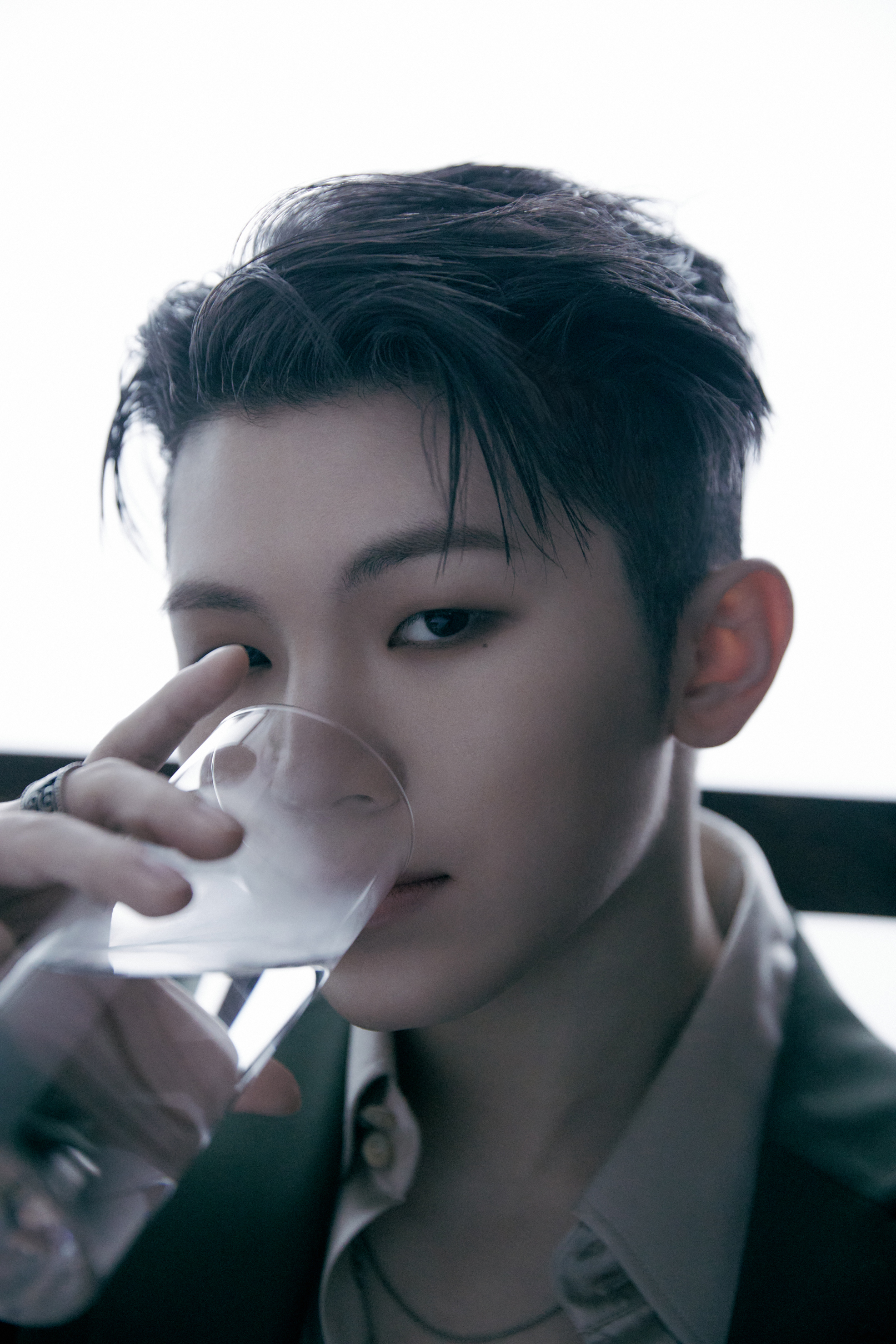
Ahead of the release of The Thirteen Tapes (TTT) vol. 2/13, a photobook commemorating the release of SEVENTEEN member WOOZI’s mixtape, Weverse Magazine is publishing an interview with the artist. You can find more photos of WOOZI and other goodies across the 64 pages of The Thirteen Tapes (TTT) vol. 2/13, which Weverse helped to make.
When people heard the news that you’d be releasing a mixtape, I don’t think they could have expected you would put out a song like “Ruby.” As a composer, you write emotional melodies, but for “Ruby” you made a repetitive melody that revolves around the rhythm. You’re also a good lyricist, although this is the first time you’ve written them entirely in English. You’re the leader of SEVENTEEN’s vocal team as well, yet you hide your voice behind a layer of effects.
WOOZI: That’s exactly what I was going for. I wanted the most un-WOOZI, but also most WOOZI-ish, music possible. I wanted to leave out, I guess you could say, my existing strengths and show the complete opposite of WOOZI. But I also wanted to show people that that aspect of me is also who I am, too.
Is there any particular reason you attempted that?
WOOZI: Come to think of it, I haven’t really focused on putting out this kind of personal project or doing that kind of work much. It’s something I wanted to challenge myself with and the label also said lots of CARAT were waiting for songs from me so I also tried to make them a nice gift. I ended up doing it for both reasons: because I wanted to give a nice present and to challenge myself. So I thought to myself, What would I do if I were working not as WOOZI, the SEVENTEEN member, but by myself? But SEVENTEEN is a diamond. Not to mention, CARAT’s there. So even if I do something alone, CARAT will be there. That’s what I thought, and then another jewel came to mind. I wanted it to be unlike me, yet like me at the same time, as much as that’s possible—strong, tough, with the power to fascinate—and that was ruby. I started from there.
Maybe that’s why the lyrical style is unlike what you usually write. And it’s not just because it’s in English, but because of how tough it is. It's surprising how you throw around parts like where you say you need “Coke Zero” and then, “shit, this is red too”—something you wouldn’t normally say.
WOOZI: I didn’t plan to do it in English at first. I spent a lot of time thinking about how to write it while making the music, but there were lots of words I could use in English that let me convey things in an intuitive and tough way. So I thought, even if it takes a little extra effort, the right way to do this song would be to write all the lyrics in English. Some of those things I probably wouldn’t have said if it were in Korean, but since I was using a different language to say things I wouldn’t normally, I felt like I was a different version of myself from a different world.
Usually songs that have lyrics about jewels address someone like, “You’re like a ruby,” but in this song, the speaker compares themselves to a ruby. That was a fresh take, too, one not commonly heard.
WOOZI: I feel like, no matter what, my personality or some part of me is always embedded in my lyrics. And I don’t like when things are too obvious. I don’t like lyrics that are too easy to picture. It should be relatable but have something unique about it.
It seems like you got to know yourself better while making the song.
WOOZI: Right from the beginning, I wanted it to be music that would answer my own question, which was, What kind of music would WOOZI do as a singer? I kept chasing and chasing and chasing that one question, and this song was waiting there at the end. Seeing how satisfied I am with it, I’m thinking this was the answer.
What makes you feel so confident about that?
WOOZI: The last thing I did on the song was finish the arrangement by putting some jazz piano in the outro. Then I felt like, Now it’s just right. I thought it would be good to have the character of WOOZI showing a range people have come to know and expect from him and the complete opposite WOOZI in the same song. So the orchestral intro gives people what they expect from me, and then the mood does a 180. I start the music off that way, but it was a little disappointing the way it finished with an outro that didn’t have any variation on the structure. So I wanted this “What kind of music would WOOZI do as a singer?” question to show up one more time in the outro, and after adding in the jazz piano, I felt like, Ah! Got it!
What’s it like to write a song that changes so drastically between sections? For each section, the melody and the rhythm change drastically, which is quite opposite to most songs you’ve written to date, which tend to unfold in a gradual journey.
WOOZI: I was envisioning that the music as a whole would sound incredibly tough. It’s fun to build up a progression, but this rapid-fire approach seems like the perfect fit for the song. It was sort of instinctive. It isn’t something I would’ve tried in the past, but I just took a shot at it and said, Maybe this would work. I even chose rock and roll because I wanted the music to capture the impression of the color red like in a ruby. It was pure intuition. I couldn’t think of any other type of sound that could express a ruby.
What was it like singing rock and roll?
WOOZI: It was a lot of fun. Like I entered a new frontier? There were parts that were difficult to practice at first because I was sort of unfamiliar with it, but once I got to recording it I was singing with passion. It feels like I’m leaning into the music whenever I’m emphasizing the rhythm or the accent. I’m way more comfortable with it now.
Has singing a different kind of song led you to discover anything new about your voice? You used effects and tried new things, like the part where you sing like you’re talking in your normal voice after the “Coke Zero” part.
WOOZI: I recorded without using any effects and put them on later when I was doing the mixing. Once I completed the song, I really wanted to add some effects to my vocals, and as soon as I heard my voice with the effects on it, I felt so excited about it. I thought, Yes, that’s it! I liked how it was exactly me, but not me as well. That way of not using any effects on just one part is something I never really tried before. I really had a lot of fun with it since it’s so clearly different from anything I sang before.
So it seems the result is, as you said, a song that’s “un-WOOZI” with “WOOZI-ish” elements. You tried jazzy elements in “HOME;RUN” before, rock in “Rock with you” and several other songs and the orchestral sound seems to be related to anime music, which you’ve expressed your love for before, or your other, lyrical songs.
WOOZI: I guess those were learning experiences for sure. I’ll have basic concepts for genres or songs in my head, but I can’t see them in full until I make them, so I tried to study while making everything I do for SEVENTEEN. The strengths I built up from my successes and failures over time was a lot of help in making “Ruby.” When I think about it, I think it made it possible to do that song, like fate.
Maybe that’s why, though it may seem natural for the song to sound the way it does, you had a method to very meticulously connect the parts genre by genre in order to give that feeling. When you transition from the orchestra to rock and roll guitar, there’s a huge sound as it changes to guitar, and when it moves from rock and roll to jazz, the two sounds match up well even though the vibe for each is completely different. You must’ve gone through a lot of experimentation in order to match and connect the notes and tones between the different instruments.
WOOZI: I did do a whole lot of experimenting. Since the notes I was matching had to transition perfectly to another instrument, I had to balance the last note of the first instrument and the first note of the next one. It took days of trying so many different things in detail. At first I wondered if it would even be possible to put into practice, since a lot of those parts started off in my imagination without consideration for whether they would be possible or not. I wondered if it would be possible, since I used some instruments that kind of clashed together in the transition points of my arrangement, and I actually failed a few times. But I tried and tried and gradually found a way. As they say, failures are the stepping stones to success. (laughs) So I found a way to move on from the intro and do one transition, then the jazz piano in the second half wasn’t fitting in the song at first, but as I kept working at it I found a good balance for that to mix it in, too.
As a producer, I would think you have to be able to quickly grasp the characteristics of all kinds of genres, given how many are represented in SEVENTEEN’s music.
WOOZI: I feel like I’m always studying. Seriously. Nowadays I’m always listening to new songs, and I’ll go on a streaming service and sometimes I’ll try menus I never had any reason to before, just looking for songs I would never bother to listen to, and give them a listen. I don’t think I should compete just with what I have right now. That’s why I keep trying to make something a little better and a little better. I think that’s why I automatically end up checking out music dozens of times in my head, even if I work by following my instincts.
In that sense, you have to combine your instinct and your calculations. What’s your method for when you’re first making a song?
WOOZI: To put it simply, there are times like that—times where I don’t want to lay down the drums first. Times where I say, I don’t want to hear the drums; I don’t want to hear a bass synth. 80% of my songwriting days are like that, somehow. The day I first tried working on “Ruby,” too, I got together with Kitae [of PRISM FILTER] on guitar and BUMZU and started that way. That version of the song was a failure, but I can say this: When I first went to make “Ruby,” I started with just one acoustic guitar and made emotion its secret weapon. Even if you make music using acoustic instruments, you’re going to end up working on a PC in the end, but emotion is an important part of the process and I think acoustic instruments are really good for that.
You’ve been working with the same artists, like BUMZU and PRISM FILTER, for a long time. What kind of advantages come from making music in various styles with the same people?
WOOZI: The biggest advantage has to be the chemistry. Since we have good chemistry, we always know what the others want, what they tend to do, what they’re good at—and we’re working hard and improving for one another, so we’re confident we’re making something that much better. I think it’s great when you have so many different musician friends to work with. It’s not like I do it with them because I can’t do it alone; it’s more about how great it is to find out more about things I don’t know well while working with them, even if I could do it alone. And we don’t keep anything from each other. If something’s not very good we say so; if it’s good, we say it’s good, and if we want to try something again, we say that. A lot of times the mixing is done by PRISM FILTER—sometimes they’ll edit a song 20 or 30 times. That’s actually one part that’s not easy when working with outside help. That stuff doesn’t cause any tension between us. The fact that we all work even harder for the final product actually makes me glad.
What kind of mark have you personally left on all these songs you’ve worked on?
WOOZI: It’s really hard to put into words, but personally, I sometimes wonder if it’s because my songs are predestined for someone specific. The singer of the song is already decided when it’s being made, you know? I’ve gone back and forth on so many different genres, tempos and concepts, but in the end, I never felt like any song wasn’t a good fit for SEVENTEEN. And I think that’s pretty interesting.
Have you found there’s a difference between when you’re making a song for SEVENTEEN versus a solo song?
WOOZI: I think I’m usually pretty good at being objective about what direction the music should take when I’m producing for SEVENTEEN. This is cooler. This sounds more like it. But for solo songs, that objective view of whether this or that is good gets blurry. So I’ve gotten a lot of advice and help from my colleagues.
HOSHI released his mixtape before yours. What kind of reaction did he have to “Ruby”?
WOOZI: HOSHI asked me first whether the song was done or not. I said to him, “It’s almost done. Do you want to give it a listen?” Then I played it for him, although I didn’t expect him to say it’s very good. Not that I wanted to hear him say he was disappointed by it. (laughs) I just wanted him to say, It’s definitely you. I thought he would just say, It’s a very WOOZI song, but as soon as he heard it, he said, “Nobody could ever pull this off, except you.” He said, “It’s totally you. I like it.” So I felt like I did a good job.
When you make SEVENTEEN songs, though, you do so in collaboration with many other people, so presumably your approach to making music is different.
WOOZI: I can take on the role of singer, suggesting a direction for the music based on what all the singers want, or I can play the role of the person who’s explaining to the singers the direction or progress the music is making. I’m happy to be able to have both views.
It’s been said that the members take far less time to record than in the past. Apparently you’ve developed a solid grasp of each member’s abilities and use that to direct the vocals. What is your directing style like these days?
WOOZI: These days, the other members will first ask me, “How should I sing this?” Then I explain to them the way I envisioned the song to be expressed. I give simple directions, like, You should sing just a little rougher, or, I think you should just relax your voice a little, then jump into the recording and have them do a few takes. What’s changed a lot from the old days is that now, when I watch them sing a few times, I can quickly catch what sound fits that member best and therefore will allow them to sing the song most comfortably. I think that’s what I try for when it comes to giving directions. Even if it’s a little different from what I initially wanted, I think I’ve changed so that I easily steer myself to match the direction that allows the other person to express themselves better as a singer.
I imagine you have to exchange ideas a lot and use a lot of energy, seeing as you’re in a position where you need to continuously communicate and make judgment calls like that. Isn’t it hard?
WOOZI: I can’t say that it wasn’t hard. But I … CARAT count on me, and so do the other members, and the other people I make music with, too. So I think it’s important that a person have that one thing in their life they can claim as their own and confidently say, This is what I do. For me, that thing is music. I think what I do now actually helped me to grow more as a human being. I try not to place importance only on my own opinions and to always listen to other people’s, and then try to judge what’s best. And I don’t even find it that hard because, if you take away the work aspect, the other members are just like family. They’re just such good, funny people.
Wouldn’t you like to have some time just to yourself?
WOOZI: That’s why I started to work out a lot. In the beginning, every single one of my hobbies were music-related, like learning to play instruments. But making music is my main job, so I wound up working out quite a bit more. Before that, I don’t think I spent any time on myself except when I was sleeping or eating. Exercising every single day allowed me to take time out for myself. It’s a good time to work on my health and empty out my thoughts. When I’m exercising, I don’t think too much about success. I get away from work a bit.
What kind of person are you when you’re away from your work? “Hug,” “All My Love” and “DOWNPOUR” are often cited as songs where you really let your emotions show. And also “A Kind of Future.” But all those songs seem to be about letting go of your feelings after something has happened. “A Kind of Future” even begins with, “As if nothing happened / Telling myself that it’s all a dream.” It occurred to me you might spend a lot of time by yourself organizing your thoughts and emotions.
WOOZI: I think that’s the core of my true character. Something somehow fragile, and timid, and—how should I describe it? Like I’m watching myself as a kid? It’s one part of who I really am.
You mentioned your younger self. What were you like as a child?
WOOZI: Well, I didn’t talk much. I couldn’t speak up like I do now, and just held everything in … Like, if some experience was difficult, or hard, or painful or anything, I mostly kept it all inside, I guess. There was no one telling me to keep it inside, and if I didn’t it wouldn’t have hurt anyone, but I think I endured things by myself.
But I’m impressed you held so much in and can still tell people you love them. In “Hug,” you sing, “You’ve had another hard day and I want to tell you,” and in “HAPPY BIRTHDAY,” which you made with CARAT, you tell them how thankful you are for them. You’re telling every CARAT that they’re loved and they deserve to be loved.
WOOZI: I find it interesting too, but I’ve got just one thing to say about that: That’s just me. I was the one who wrote the lyrics, so of course I mean it. There’s lots of lyrics where you could ask, Why are those the lyrics you came up with? But, honestly, I don’t know why—that’s just the way I think. I think it’s just—it fully reveals the real me.
Don’t you want to be loved, or feel like you’re loved—I mean, in the way you express love?
WOOZI: That’s a great way to put it. I’m sure that’s part of it. I think maybe that’s why I started thinking about other people more.
You receive a lot of love, from the other members and from CARAT, as part of SEVENTEEN. I guess you think a lot about SEVENTEEN for that reason.
WOOZI: The members and I always jokingly say, “The next album is the most important thing for us.” But I don’t think we’re just saying that. Sometimes I forget it, but now and then I think about how truly amazing a team we make. It’s not because of what we accomplish; it’s more like, the 13 of us have been together so long, as far back as our trainee days, yet we all have good relationships with one another, everyone renews their contracts and we get along so ridiculously well like this? That’s why I think we make an amazing team. So, we were practicing again yesterday, but we had such a good energy going that we couldn’t stop laughing. Even after years of living together, we’re still playing little jokes on each other and laughing along, and it keeps making me think how amazing our team really is together. I believe the next album—which will be so important—won’t crumble, and will be even better, because we know how precious this all is.
Unauthorized reproduction and distribution prohibited.



